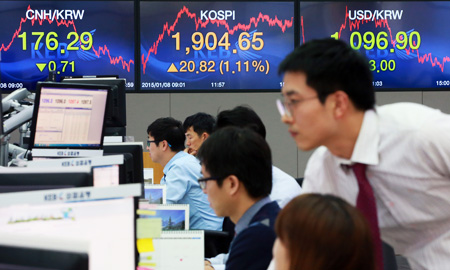Corporate bond sales in South Korea have surged since the 2008 global financial crisis as local companies took advantage of low borrowing costs while reducing stock offerings amid a bear run on the local stock market, data showed Wednesday.
According to the data compiled by Korea Capital Market Institute, bond sales accounted for 95.3 percent of corporate direct financing in 2014, compared with 93.6 percent in 2008.
In contrast, stock offerings accounted for 4.7 percent in 2014, down from 6.4 percent in 2008, the data showed. The portion of corporate bonds peaked at 98.2 percent in 2012.
 The sales of general bonds made up 36.4 percent of the total corporate debt issuance in 2014, down from 37.5 percent in 2008, due to heightened credit risks amid the economic slowdown. The portion of financial debentures, meanwhile, increased to 27.1 percent from 22.4 percent over the cited period on the back of an expanded auto financing market, the data showed.
The sales of general bonds made up 36.4 percent of the total corporate debt issuance in 2014, down from 37.5 percent in 2008, due to heightened credit risks amid the economic slowdown. The portion of financial debentures, meanwhile, increased to 27.1 percent from 22.4 percent over the cited period on the back of an expanded auto financing market, the data showed.
Asset-backed securities’ presence also increased to 15.7 percent from 11.3 percent, while that for bonds sold by banks declined to 20.8 percent from 28.8 percent, they showed.
The Bank of Korea’s policy rate has hovered around 5 percent in 2007, but fell to a 2-percent range in 2009 after the global financial crisis. The base rate rose to a 3-percent level in 2011, but again slipped to the 2-percent range last year.
Last month, the central bank additionally trimmed the rate by a quarter percentage point to a record low of 1.75 percent to support growth in Asia’s fourth-largest economy.
Local companies also have remained reluctant in raising money by offering stocks due to a sluggish move on the local stock market. The country’s stock market has been boxed in a tight range for the past few years due to weak corporate earnings and weak growth momentum.
By company, Shinhan Financial Group, the country’s largest banking group by assets, sold the largest bonds valued at 10.7 trillion won ($9.8 billion), followed by the state power operator Korea Hydro & Nuclear Power Corp. with 7.94 trillion won, No. 3 banking group Hana Financial Group with 7.45 trillion won, and top steelmaker POSCO with 4.32 trillion won, the data showed.
“Bank holding companies heavily sold debts to finance mergers, and state-run utility firms tapped the local bond market to raise capital for facility investment,” said the institute. (Yonhap)

